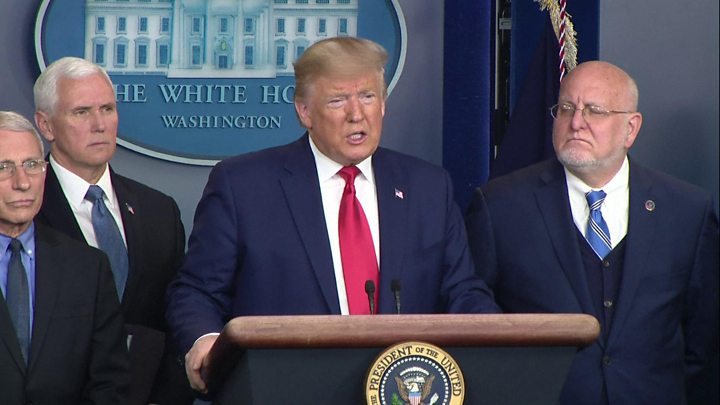
Trump: "It's been a hard journey for everybody"
The US has started withdrawing troops from Afghanistan as part of a deal with the Taliban aimed at bringing peace to the country.
The US agreed to reduce its troops from about 12,000 to 8,600 within 135 days of signing the agreement.
Drawing back troops was a condition of the historic peace deal signed by the US and the Taliban on 29 February.
The Afghan government did not take part in the deal, but is expected to hold talks with the Taliban.
Afghanistan's President Ashraf Ghani initially said he would not comply with an agreement to release Taliban prisoners as a pre-condition for direct talks with the militant group.
But reports say the president, who was inaugurated for a second term on Monday, will issue a decree for at least 1,000 Taliban prisoners to be released this week.
The peace deal appeared fragile last week after the US launched an air strike in response to Taliban fighters attacking Afghan forces in Helmand province.
The Taliban called for de-escalation and on Monday, Col Sonny Leggett, a spokesman for US forces in Afghanistan, announced the first phase of the American withdrawal.
The US retains "all the military means and authorities to accomplish our objectives" in Afghanistan despite the withdrawal of troops, Col Leggett said in a statement.
The US and its Nato allies have agreed to withdraw all troops within 14 months if the militants uphold the deal.
Under the agreement, the militants have agreed to refrain from attacks as well as not allowing al-Qaeda or any other extremist group to operate in the areas they control.
US-led forces ousted the Taliban from power weeks after the September 2001 attacks in the US by al-Qaeda, then based in Afghanistan. The Taliban regrouped and became an insurgent force that by 2018 was active in more than two-thirds of the country.
More than 2,400 US troops have been killed during the conflict.
As the drawdown of US troops began on Monday, fresh political instability threatened any prospect of talks between all sides in the country.
Two separate swearing-in ceremonies took place on Monday for two different politicians after disputed elections last year.
Afghanistan's electoral commission says incumbent Mr Ghani narrowly won September's vote, but Abdullah Abdullah alleges the result is fraudulent.
Experts warned the current political rivalry would "gravely affect the government's position in the upcoming intra-Afghan talks", which are due to begin on Tuesday.
The Trump administration said it opposed "action to establish a parallel government" in an apparent show of support for Mr Ghani's presidency.
"Prioritising an inclusive government and unified Afghanistan is paramount for the future of the country and particularly for the cause of peace," US Secretary of State Mike Pompeo said in a statement on Monday. BBC